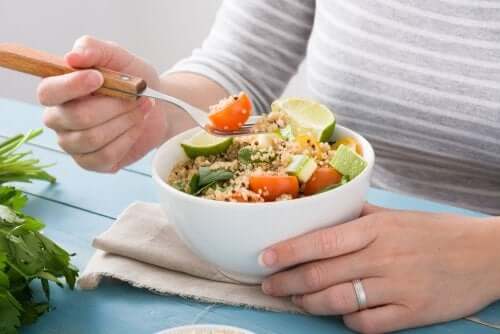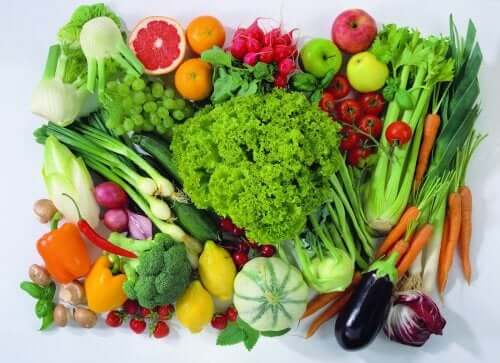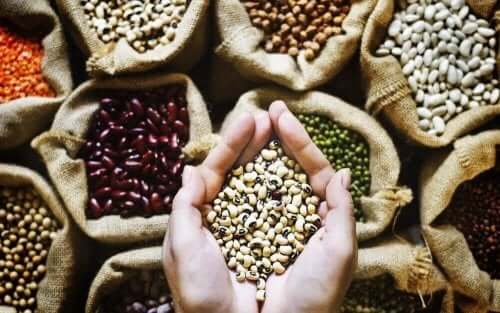Foods You Should Eat if You're a Vegan Athlete


Written and verified by the nutritionist Eliana Delgado Villanueva
You can play sports if you’re vegan. Vegan and vegetarian diets are appropriate for all stages of life and all types of people. The vegan diet will provide you all the specific nutrients you need if you choose the right foods and plan your menus well. However, this diet should be well-planned to prevent nutritional deficiencies, improve your performance, and prevent injuries.
In this article, we’ll tell you what foods you should eat if you’re a vegan athlete.
A vegan diet for athletes

Although a vegan diet isn’t incompatible with playing sports, it requires you to incorporate more nutrients.
A vegan may either have ideological or health motivations or simply choose to follow this diet because it’s the kind of food they like. Either way, their menus can be as equally balanced as those of omnivores. That said, the vegan diet isn’t incompatible with playing sports or becoming a professional athlete.
However, a vegan diet for athletes should take into account an athlete’s needs. Also, they should take special care to replace the proteins that foods of animal origin contain.
Do vegan athletes exist?
The answer to this question is a resounding yes! Also, vegan athletes compete in all kinds of sports. Here are some examples:
- Lizzy Hawker, a long-distance runner and five-time winner of the Ultra-Trail Tour du Mont Blanc.
- Edwin Moses, a two-time Olympic champion in 400 m hurdles.
- Dave Scott, a vegan triathlete and six-time Ironman Triathlon Hawaii champion.
- Alberto Pelaez Serrano, a vegan long-distance runner.
- Sergio Agüero, a professional soccer player.
- Patrik Baboumian, a German heavyweight competitor.
- The Williams sisters, tennis players.
- Frank Medrano, a calisthenics bodyweight expert.
So what do they do to maintain their diet and get the nutrients their athletic bodies need? Let’s find out.
You should also read: Delicious Fat-free, Eggless Vegan Carrot Cake
Foods you should you eat if you’re a vegan athlete
Fruits and vegetables

Fruits and vegetables should be the mainstay of an athlete’s diet, as they provide energy for training.
A vegan athlete should base their diet on fresh, seasonal foods. Athletes who follow a vegan diet shouldn’t only eat rice and pasta, as many people tend to believe.
Seasonal vegetables and fruits are essential, because, like all athletes, vegan athletes need more of certain vitamins and minerals.
Athletes who are trying to lose fat should prioritize vegetables. Meanwhile, athletes who want to gain weight and improve their performance should prioritize fruit (among the other foods we’ll mention below), because, although it’s also filling, it provides more calories and carbohydrates than the previous group.
Carbohydrates in a vegan athlete
Vegan athletes should include rice, oats, quinoa, and other seeds and nuts that will provide many different vitamins and minerals, in addition to protein and healthy fats. Legumes and nuts are good sources of carbohydrates, in addition to the main sources of protein in the vegan diet.
This is one of the reasons why vegan athletes should renounce other less nutritionally-interesting grains in favor of adding more dietary choices with legumes, seeds, and nuts. They should opt for legume flours (such as chickpea flour) or vegetable pasta (such as pea or lentil pasta) instead of wheat pasta.
Protein

Legumes are a major source of vegetable protein, which is why athletes should incorporate them into their diets.
For many, protein is the problem with vegan diets in athletes. After all, when most people think of this macronutrient, only animal sources come to mind. However, legumes and nuts are good sources of vegetable protein.
They can be consumed in stews, salads, and preparations such as hummus or butter such as cashew and peanut butter, which are very calorie and nutrient-dense. Other good options are cream versions of nuts (almond and hazelnut cream), which you can make at home by grinding nuts.
Also, mushrooms are foods to consider due to their nutritional value, as well as brewer’s yeast. A few tablespoons can provide any of your dishes with approximately 12-15 grams of protein.
This article may interest you: Six Vegan Breakfasts You’ll Love
Fats for a vegan athlete
Essential fatty acids are another common drawback in vegan diets. As you probably know, oily fish is the best source of omega-3 essential fatty acids. However, that doesn’t mean they’re the only foods that contain them.
You can find vegan sources of fat in:
- Nuts. Walnuts, peanuts, almonds, hazelnuts, cashews, pistachios, and pine nuts, among others.
- Seeds. Pumpkin, sunflower, sesame, flax, and poppy, among others.
- Fatty fruits. Avocados, olives, etc.
- Olive oil, nuts, and seeds.
- Vegetable margarine (preferably organic).
Remember that it’s the responsibility of the certified sports nutritionist to help you ensure that your diet is complete, balanced, and meets your needs. This will allow you to enjoy optimal health.
All cited sources were thoroughly reviewed by our team to ensure their quality, reliability, currency, and validity. The bibliography of this article was considered reliable and of academic or scientific accuracy.
- Davies RW., Carson BP., Jakeman PM., The effect of whey protein supplementation on the temporal recovery of muscle function following resistance training: a systematic review and meta analysis. Nutrients, 2018.
- Lima LCR., Barreto RV., Bassan NM., Greco CC., et al., Consumption of an anthocyanin rich antioxidant juice accelerates recovery of running economy and indirect markers of exercise induced muscle damage following downhill running. Nutrients, 2019.
- Jeromson S., Gallagher IJ., Galloway SDR., Hamilton DL., Omega 3 fatty acids and skeletal muscle health. Mar Drugs, 2015. 13 (11): 6977-7004.
This text is provided for informational purposes only and does not replace consultation with a professional. If in doubt, consult your specialist.








